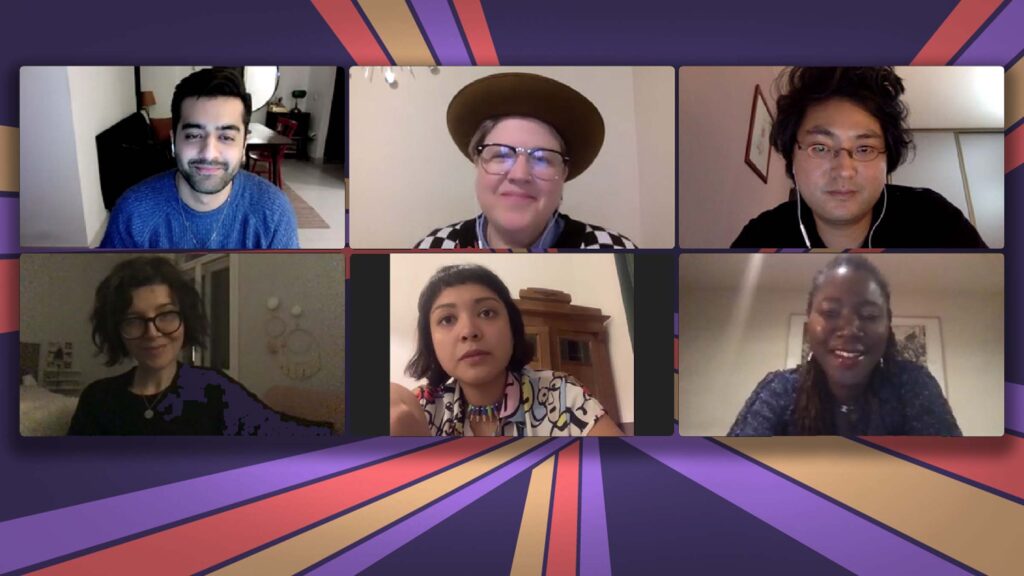
Across multiple continents, cultures and time zones, the 2023 Film Independent Spirit Award nominees for Best International Film convened in Film Independent’s virtual space as part of the 2023 Directors Close-Up.
Gathering together for a vibrant discussion of their work and hailing from widely diverse backgrounds, the filmmakers included: Marie Kreutzer (Corsage), dialing in from Vienna; Martika Escobar (Leonor Will Never Die), originally from the Philippines but calling from Berlin; Davy Chou (Return to Seoul) in Lyon, France; Alice Diop (Saint Omer) in Paris; and Saim Sadiq (Joyland) in Karachi, Pakistan. The Director’s Close-Up panel was introduced by Fi Senior Director of Educational and International Initiatives Maria Bozzi and moderated by Jenn Wilson, Fi’s Senior Programmer.
Distinguishing the achievement of these filmmakers and the difficulty of selecting just five films from the strong pool of submissions, Wilson noted common threads among the selected films and celebrated their feats of representation. She got the ball rolling with a question ripe for a skilled group of directors such as this: What makes a great lead actor, how did you choose your lead performers, and how did you know they were the one when you found them?
Speaking of her film Corsage, Marie Kreutzer explained how her collaboration with Vicky Krieps predated the film itself. “It was her idea to make the film in the first place. We made a film together before and then we wanted to work together again. At one point she said, ‘Why don’t we make a film about Empress Ceci?’ I didn’t really think that was a good idea at that point, but now here we are years later. This was always our project together.”
Kreutzer was effusive in her praise of Krieps: “She is very much in the moment. She does not serve herself at all. She’s very trustful to the camera and the view of the director, and she’s very eager to play and to just let all the preparation go and just be in the moment together, that’s why I love working with her.”
In the making of Leonor Will Never Die, director Martika Escobar shared a similar sentiment about her lead actress Sheila Francesco, who plays Leonor Reyes, of the vital balance of friendship and personal chemistry in a working relationship: “Sheila is a theater actress so she’s naturally just very talented, but the reason why I picked her is because when she read the script she felt like a real person. I would do casting all the time at home, inviting people just to read but it’s really the time I spend with them off camera that makes me decide if they’re the right person for the role. And it’s much about feeling them as people more than their acting range or capabilities, of course it’s a balance of both, but it’s really just based on vibe.”
Escobar continued. “I think with Sheila, we got [the part of] the lover really well because we have a similar philosophy on life, on seeing life as a film or something, so she could resonate with that and I think it’s important to align emotionally with people.”
Director Davy Chou said that the main character in Return to Seoul, Freddy, was based on a real person who was a friend of his. “Once starting the casting, I have to say I felt a bit naive, maybe with lack of experience since ideally when you write, [you] just write without really thinking of the reality. Then you finish writing and you stand to go to production and find the right actor or actress for the role. I kind of felt trapped because I really wanted actors with real Korean roots because that’s basically, let’s say, in the DNA of the character and the film dealing with identity and culture.”
Chou describes how his choices were narrow to begin with. “In France, the Korean immigration is not as big as other Asian immigrants such as Chinese, Vietnamese, or Cambodian–I’m from Cambodian descent, for example. The number of proficient actresses [who were] French-Korean was pretty limited. I met a lot of Korean adoptees, because that is what the film is about: the experience of a 25-year old Korean adoptee growing up in France. But I couldn’t find the right fit. I was just lucky that one day I met a guy who was a Korean adoptee himself and after talking to him for a while about my film, he said ‘you need to meet that girl (Ji-Min Park)… Everything you tell me of the personality of your character just reminds me of her.’”
After meeting Park in Paris, Chou felt “She looked like the alter ego of the character I did write in my script. She was mesmerizing and [did] what I could say natural-born actors can do which is jumping into the void, of just digging to the raw emotions and feeling immediately without any fear of judgment or any fear of context and surrounding. It was clear that she was the one but it was, I have to say, pretty fortunate that I kind of found her kind of randomly where she would have never answered to any casting announcements so I found myself very lucky in that process.”
Saim Sadiq echoed such ongoing challenges in the casting process for the transgender lead in Joyland. “We put out a casting call and searched for six months and auditioned somewhere around 600 people, 600 boys and it was excruciatingly painful. Most of the people I found not to be correct for the part and the people who I did would read the script and say no. And most of them were not even established actors. They were new actors and this was a lead part in a movie, but they were like ‘No, we can’t do this.’ And I understood that it was going to be hard to find a guy who is willing to play a character like this one, who is free from that kind of machismo that they’re eager to play. Ali Junejo, who plays the part, was actually the last audition, the last guy on the list and I auditioned him on that table actually,” he said, pointing at said table in his zoom background.
They chatted for an hour and within the first few minutes of the dry read, Sadiq instantly knew Junejo was the one for the role. “He just read the first couple of lines and I was like ‘it’s him.’ It was just so instant and so clear, and it’s so undefinable what exactly did I like about him and that moment, but retrospectively speaking he was an incredibly intelligent actor, [with] a similar worldview but a different investigation that he had, which I think was great. He had something to investigate about the character which was very much his own. Something to find which wasn’t on paper. I felt like [he was] taking care of a part I’m not even aware of.
Saint Omer, Alice Diop’s first feature film amidst a background in documentaries, was based on a trial she witnessed firsthand. She found the casting process most significant: “It was the moment that I met Guslagie Malanda and Kayije Kagame, the two leads of the film, before I began writing and before I even really spoke to them, [that] I was immediately inspired by their way of being, by their presence and I felt that there was something about their intimate, private biographies and stories from their lives that they hadn’t told me that would be in dialogue with the story I had to tell.” Diop felt the continuous long-shot style of the film demanded a truth from the actors that could not be performed or faked, firmly believing her casting process vital to the direction of the film.
The rest of the conversation flowed with ease across different terrain, from the conception of history as necessarily interpretative to the brutality of the press, from the visibility of female-centric stories to the cruel extremes of the migrant experience. The directors seemed to agree that making themselves happy had to be the top priority in their filmmaking experience. They each took to sharing a few names and titles from which they have drawn inspiration in their work and also offered wisdom of their own for young filmmakers – follow your heart and befriend your AD!
To watch the full panel and check out the full conversation of the Best International Film Award nominees, purchase a series pass here and get access to all other 2023 DCU online and in-person sessions as well.
Film Independent promotes unique independent voices by helping filmmakers create and advance new work. To become a Member of Film Independent, just click here. To support us with a donation, click here.













